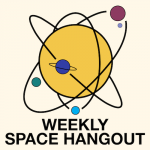Podcaster: Host : Fraser Cain; Guest: Dr. Francis Halzen, C.C. Petersen, Dave Dickinson

Title: Weekly Space Hangout Chillin’ with Dr. Francis Halzen, PI of IceCube
Link: Cosmoquest: http://cosmoquest.org
Description:
Special Guest: Viewers who watched our November 16, 2022, episode may remember that Dr. Leah Jenks told us about high-energy neutrino emissions from NGC 1068 that were detected by IceCube. (https://icecube.wisc.edu/news/press-releases/2022/11/icecube-neutrinos-give-us-first-glimpse-into-the-inner-depths-of-an-active-galaxy/) This week we are pleased to welcome Dr. Francis Halzen, Principal Investigator for IceCube, who will discuss the significance of these detections in understanding how active galaxies “work,” and potentially ushering in the age of Neutrino Astronomy.
With funding from the National Science Foundation the IceCube project at the South Pole melted eighty-six holes over 1.5 miles deep in the Antarctic icecap to construct an enormous astronomical observatory. The experiment discovered a flux of neutrinos reaching us from the cosmos, with energies more than a million times those of neutrinos produced at accelerator laboratories. These cosmic neutrinos are astronomical messengers coming from some of the most violent processes in the universe and from the biggest explosions since the Big Bang. We will discuss the IceCube telescope and highlight the recent discoveries that some high-energy neutrinos—and cosmic rays—originate from sources powered by rotating supermassive black holes.
Francis Halzen is a Vilas and Gregory Breit Distinguished Professor of Physics at the University of Wisconsin–Madison.
Born in Belgium, Halzen received his Master’s and PhD degrees from the KUL Leuven, Belgium, and has been on the physics faculty at UW–Madison since 1972; in 2021, Halzen was named a Vilas Research Professor, one of the university’s most prestigious honors. He has been a fellow of the American Physical Society since 1994, and is the recipient of numerous awards, including the 2014 “Smithsonian” American Ingenuity Award (https://icecube.wisc.edu/news/awards/2014/10/uw-physicist-francis-halzen-receives-american-ingenuity-award/) the 2015 Balzan Prize (https://icecube.wisc.edu/news/awards/2015/09/francis-halzen-wins-2015-balzan-prize/, a 2018 Bruno Pontecorvo Prize, the 2019 IUPAP Yodh Prize (https://icecube.wisc.edu/news/awards/2019/08/francis-halzen-awarded-2019-yodh-prize/, the 2021 Bruno Rossi Prize of the American Astronomical Society (https://icecube.wisc.edu/news/awards/2021/01/icecube-collaboration-awarded-2021-rossi-prize/, the 2021 Homi Bhabha Award (https://icecube.wisc.edu/news/awards/2021/07/2021-homi-bhabha-award-given-to-francis-halzen-icecube-pi/) and honorary doctorates at several universities.
Halzen is the Principal Investigator of IceCube, a cubic-kilometer neutrino telescope buried in the Antarctic ice at the South Pole. IceCube’s first observations of high-energy cosmic neutrinos garnered the 2013 “Physics World” Breakthrough of the Year Award. In September 2017, IceCube detected a high-energy neutrino from the direction of a blazar called TXS 0506+056. This was the first-ever evidence of a source of high-energy cosmic rays, whose origins have been notoriously difficult to pinpoint since they were discovered over one hundred years ago.
Also a skilled science communicator, Halzen travels widely, giving about 20 or more invited talks per year at conferences, workshops, and colloquia. He also gives regular public talks to local and national groups and interviews for television and radio. Halzen is the co-author of “Quarks and Leptons”, a classic textbook on modern particle physics that continues to be used extensively throughout college campuses today. He has a large number of publications to his credit and has written or edited several other books. His essay “Antarctic Dreams,” about the early days of AMANDA, IceCube’s precursor, was featured in “The Best American Science Writing 2000”.
Today’s story:
- The top astronomy events for 2023!
- Jan 31: Moon occults Mars
- Venus is <1 arcmin from Neptune
- May 17: Moon occults Jupiter
- Oct 14: Annual solar eclipse Oregon ——> Texas
- Comets leaving a dusty trail in the solar system.
- The top spaceflight events for 2023!
- ESA’s upcoming mission to see if Venus is volcanically active.
- The landing of the Orion capsule.
- The fusion reaction at the NIF.
Host: Fraser Cain ( @fcain )
Regular Guests:
- C.C. Petersen ( http://thespacewriter.com/wp/ & @AstroUniverse & @SpaceWriter )
- Dave Dickinson ( http://astroguyz.com/ & @Astroguyz )
Today’s sponsor: Big thanks to our Patreon supporters this month: Rob Leeson, David Bowes, Brett Duane, Benett Bolek, Mary Ann, Frank Frankovic, Michael Freedman, Kim Hay, Steven Emert, Frank Tippin, Rani Bush, Jako Danar, Joseph J. Biernat, Nik Whitehead, Michael W, Cherry Wood, Steve Nerlich, Steven Kluth, James K Wood, Katrina Ince, Phyllis Foster, Don Swartwout, Barbara Geier, Steven Jansen, Donald Immerwahr
Please consider sponsoring a day or two. Just click on the “Donate” button on the lower left side of this webpage, or contact us at signup@365daysofastronomy.org.
Or please visit our Patreon page: https://www.patreon.com/365DaysOfAstronomy
End of podcast:
365 Days of Astronomy
=====================
The 365 Days of Astronomy Podcast is produced by Planetary Science Institute. Audio post-production by Richard Drumm. Bandwidth donated by libsyn.com and wizzard media. You may reproduce and distribute this audio for non-commercial purposes.
This show is made possible thanks to the generous donations of people like you! Please consider supporting to our show on Patreon.com/365DaysofAstronomy and get access to bonus content.
After 10 years, the 365 Days of Astronomy podcast is poised to enter its second decade of sharing important milestone in space exploration and astronomy discoveries. Join us and share your story. Until tomorrow! Goodbye!

